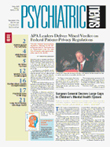It is certainly no surprise that people with psychiatric disorders experience high levels of distress when they find themselves hospitalized for a nonpsychiatric medical disorder. But a new study of male veterans finds that the distress and lower levels of functioning that accompany such a hospital stay persist long after the individual is discharged.
This finding highlights the need for physicians to look beyond the acute illness that led to the patient’s hospitalization and “to evaluate the mental health status of their hospitalized or more seriously ill patients,” said researcher Brenda Booth, Ph.D., of the psychiatry department at the University of Arkansas for Medical Sciences and the Little Rock VA Medical Center. The study was published in the January Journal of General Internal Medicine.
This need to assess functioning once patients leave the hospital is especially crucial in an era in which clinicians and health care organizations are facing demands for meaningful outcome data on the patients they treat.
Booth and her colleagues evaluated 734 male veterans at three Veterans Affairs hospitals who were hospitalized for serious medical illnesses such as cancer, heart disease, digestive diseases, or injuries. The study patients were chosen at random after being admitted to either acute medical or surgical wards. Nearly half of these veterans had a current or past DSM-III-R diagnosis, most for major depression, dysthymia, substance abuse disorders, or posttraumatic stress disorder.
The researchers excluded women from the study since they accounted for only about 1 percent of the admissions to the three VA hospitals in which the study was conducted.
The patients, about two-thirds of whom were aged 65 or older, were assessed soon after they were admitted to the hospital. They completed measures of comorbid psychiatric disorders and psychological distress, health-related quality of life (HRQL), and illness severity. The researchers assessed the co-occurring psychiatric disorders using the Quick Diagnostic Interview Schedule for DSM-III-R (Q-DIS) and the Symptom Checklist-90 (SCL-90). They used the 36-item Medical Outcomes Study Short Form (SF-36) to evaluate patients’ HRQL.
They assessed the subjects again at three and 12 months after discharge. Follow-up evaluations were made through self-assessments that the former patients mailed in or by telephone interview. They were compared with a control group of hospitalized patients who had no current or past psychiatric diagnosis.
Booth and her colleagues found that at the 12-month assessment, the subjects displayed significant declines in HRQL measures, with the exception of the items measuring physical functioning and vitality. None of the HRQL measures improved over the one-year study period. The psychological distress measures and assessments of depression and anxiety symptoms all increased over the 12-month follow-up.
“Our findings indicate the substantial impairments in functioning associated with psychiatric disorders during medical hospitalizations are not short term and do not subside, but continue over the space of one year,” the researchers pointed out.
Intervening to reduce the distress accompanying medical hospitalizations requires the use of brief mental health and substance abuse screening tests, Booth noted. “One clinical option is to evaluate for signs or symptoms of distress during a medical crisis, continue to observe during follow-up care, and intervene later if distress persists longer than a few weeks,” Booth said.
She also urged physicians to address relapse prevention in hospitalized patients with psychiatric illnesses, noting that primary care physicians should consider prescribing preventive medication or referring these individuals to mental health care providers.
The article describing this study will be available on the Web at www.sgim.org by clicking on “Publications,” “Journal of General Internal Medicine,” “Online Versions,” and “January 2001.” ▪
